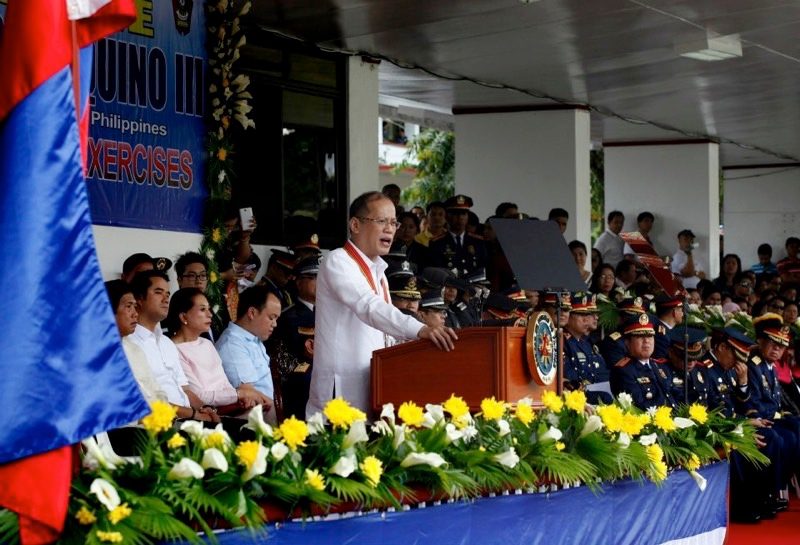SUMMARY
This is AI generated summarization, which may have errors. For context, always refer to the full article.

MANILA, Philippines – The Secretary of Justice insists the President is not the Commander-in-Chief of the Philippine National Police (PNP) but its Chief Executive, since the police force is a civilian agency.
But a speech delivered by President Benigno Aquino III during the police academy’s graduation in 2013 seems to say otherwise.
“Malinaw po ang atas ko bilang Commander-in-Chief at hindi optional ang pagsunod sa batas. Wala akong sisinuhin sa nagtitigas-tigasan pa rin sa ating kautusan,” Aquino told graduates from the Philippine National Police Academy (PNPA) of 2013 in a speech.
(My mandate as Commander-in-Chief is clear, and following the law is not a mere option. Those who refuse to follow my orders will not be spared.)
The President then was referring to members of the PNP who failed to enforce a ban on logging. The commencement speech was also delivered in the wake of the Atimonan massacre, which also involved several PNP officers and personnel.
The 2013 speech caught the attention of the public following the release of the PNP Board of Inquiry’s report on “Oplan Exodus,” a bloody police operation that claimed the lives of 67 people, including 44 elite policemen.
According to the BOI, Aquino “bypassed the established PNP Chain of Command” when he dealt directly with now-sacked PNP Special Action Force (SAF) chief Police Director Getulio Napeñas instead of PNP OIC Deputy Director General Leonardo Espina.
The report noted Aquino also “allowed the participation” of his friend, former PNP chief Director General Alan Purisima, who was then serving a preventive suspension order over a graft case.
Commander-in-Chief vs Chief Executive
Aquino’s Cabinet officials quickly came to his defense a day after the report was released on March 13.
In a statement released on Saturday, March 14, Justice Secretary Leila de Lima said that although the BOI report, the most comprehensive on Mamasapano thus far, was “laudable”, it “starts on the wrong premise insofar as the role of the President as Commander-in-Chief of the PNP is concerned.”
In a separate statement released also on Saturday, Aquino’s spokesman Secretary Edwin Lacierda also scored the BOI report for its “potentially hastily-made conclusions and opinions” when it came to discussing the President’s role.
Reflecting the same stance on the President as “Chief Executive” and not “Commander-in-Chief” of the PNP, Lacierda added the BOI “contradicted itself” when it said the President had the prerogative to deal with Napeñas himself.
“The President as Chief Executive cannot be subordinated to an internal process within the PNP when he has control and supervision over all its members, regardless of rank,” said Lacierda, who added that Aquino “himself instructed [Purisima] to inform [Espina] of the mission.”
Aquino’s supposed orders to Purisima are not part of the BOI report. Purisima declined to be interviewed by the Board, which is headed by Police Director Benjamin Magalong, and instead opted to submit a sworn affidavit.
The BOI wanted to interview Aquino and said it made its intentions known through Interior Chief Manuel Roxas II and Espina. (READ: Will Aquino speak to police investigators?)
In an interview with reporters, Magalong said he did not hear back from either Roxas or Espina.
Lacierda also criticized the BOI and Magalong for not making an official request for an interview. “Instead, it introduced innuendos and resorted to speculations to reach some of its conclusions,” the report said.
Former Senator Panfilo Lacson, who himself was once the chief of the PNP, defended the BOI and Magalong from the executive branch’s criticisms.
In a tweet, Lacson pointed out that the Constitution says “the President shall be the Commander-in-Chief of all armed forces of the Philippines.”
“How can [the PNP] not be covered under the commander-in-chief provisions on all armed forces when [the PNP is an] armed force?” he told Rappler in an interview. Magalong is known to be a protégé of the former PNP chief.
The PNP was formed in 1991, and is a merger of the Integrated National Police (INP) and the Philippine Constrabulary, which was a part of the Armed Forces of the Philippines (AFP).
De Lima also criticized the BOI for not “confronting” the PNP’s misplaced military culture and tradition” which is “underpinned by its most basic belief that it is still part of the armed forces.” – Bea Cupin/Rappler.com
Add a comment
How does this make you feel?
There are no comments yet. Add your comment to start the conversation.